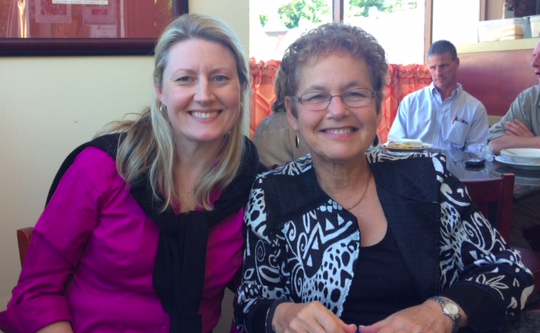Learning from the field of work-based mentoring.
For decades, the fields of youth mentoring and work-based mentoring have operated on parallel tracks–covering the same terrain but somehow unaffected by of each other. With few exceptions (e.g., the excellent Blackwell Handbook of Mentoring, which is edited by Professors Tammy Brown and Lillian Eby), disciplinary boundaries have gotten in the way of learning what others are doing in the field of mentoring.
But yesterday, I had the good fortune of meeeting with two exceptional scholars who are redefining the scholarship on workplace mentoring., Professors Kathy Kram (right) and Wendy Murphey (left, see below)
Professor Kathy Kram, the Richard C. Shipley Professor in Management Boston University School of Management, is considered the leading scholar in work-based mentoring. Her book, Mentoring at Work, is considered a classic and has influenced generations of scholars working in this area. Professor Wendy Murphy is Associate Professor of Management at Babson College has studied mentoring since she was a doctoral student, completing her dissertation on the roles of work- versus non-work relationships. As we talked, the parallels between the two subfields became clear. Perhaps most striking was a comment by Professor Kram in which she briefly described the history of work-based mentoring. “Throughout the 80’s and 90’s, most companies wanted formal mentoring programs and considerable time and expense went into creating one-on-one matches. The problem was that this approach did not yield good results, and least 20% of formal mentoring relationships were unsuccessful. So companies are beginning to consider alternatives that include creating a culture of mentoring. To the extent that mentoring is incorporated into performance reviews and promotion criteria, today’s workers will be more likely to serve as informal mentors to others within the organization.” The relationships don’t have to be one-on-one, in fact innovative strategies including peer mentoring and mentoring circles are gaining steam. We will be taking up many of the same topics in our upcoming short course on strengthening the bonds between formal and informal mentoring. These topics are also covered indepth in their new book, STRATEGIC RELATIONSHIPS AT WORK: CREATING YOUR CIRCLE OF MENTORS, SPONSORS, AND PEERS FOR SUCCESS IN BUSINESS AND LIFE. In this book, Professors Kram and Murphy at Babson College distill 30 years of research into practical wisdom about mentoring, coaching, mentoring circles and developmental networks—all of which leads to guidelines that will enable you to build relationships critical for your personal success.
The first part of the book provides an overview of what makes for high quality relationships and gives the reader a number of assessment tools to create a personal strategy for building an effective circle of mentors, sponsors and peers. We argue that you must first know yourself—your values, goals, interests, talents and limitations—before you can begin to build relationships that will support you in achieving your aspirations. Once this self-knowledge is developed, it is up to you to assess whether you have relationships in place that can support your current and future aspirations. Through a structured process, you are invited to assess your current developmental relationship map, and to systematically identify where you may have some gaps that should be filled. We also outline the relational skills that are essential to reaching out to cultivate such growth-enhancing relationships including proactivity, curiosity, deep listening, self-disclosure, and self-management.
The second part of the book offers strategies for building different types of relationships and invites those in leadership positions to foster developmental relationships in their organizations through formal programs, their own efforts to build effective alliances, and rewarding others for doing so. Drawing on examples from well known businesses as well as small startups and healthcare systems, we illustrate differences between mentors and sponsors, the potential of peer coaching, and the multiplier effect of peer circles whose primary purpose are to enhance participants’ learning .
Finally, the last part of the book outlines what to do when relationships go awry to minimize negative impact on your career. Via case examples of “tor-mentors” we illustrate the “red flags” that suggest when a relationship is no longer mutually beneficial, and offer specific communication tactics for ending it and moving on. In this part of the book, we also outline specific strategies for building mutually satisfying relationships across gender, racial and ethnic boundaries to foster diverse relationships that also support learning and development. And, since technology is transforming the way we do business and relationships, we consider how to leverage this powerful tool for creating and sustaining high quality connections at work.
Ultimately, this step-by-step guide will help programs leverage interpersonal skills, using the most effective tools available for creating a strong developmental network that grows with your career. You’ll find ready-to-use checklists and worksheets, self-assessments, reflective exercises, graphs, charts and other visual tools to map out your own personal network of developers inside and outside of work. With this book in hand you will be able to form mutually rewarding relationships at work, create strong connections with meaning and purpose, and experience greater satisfaction and success—in business and life.









